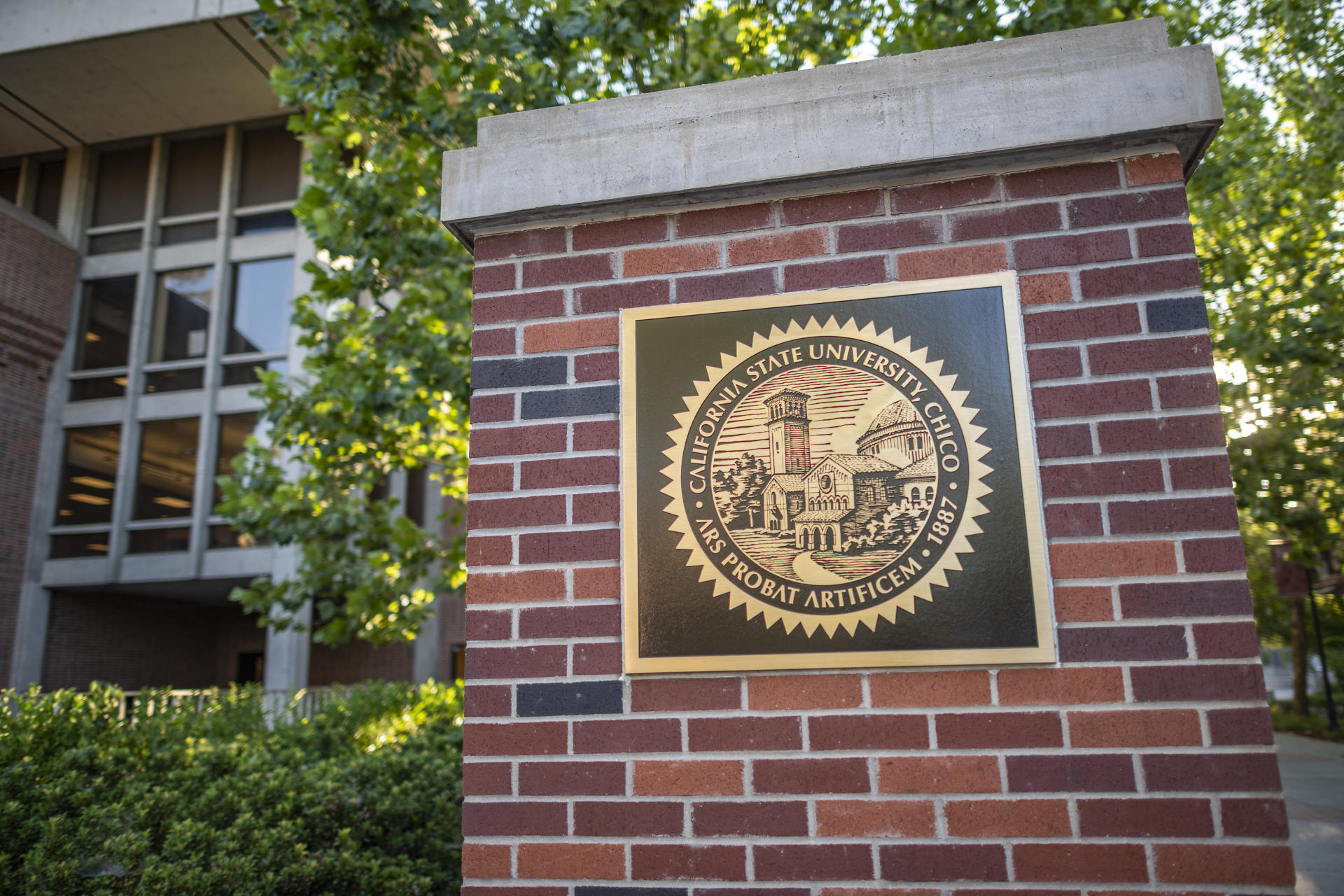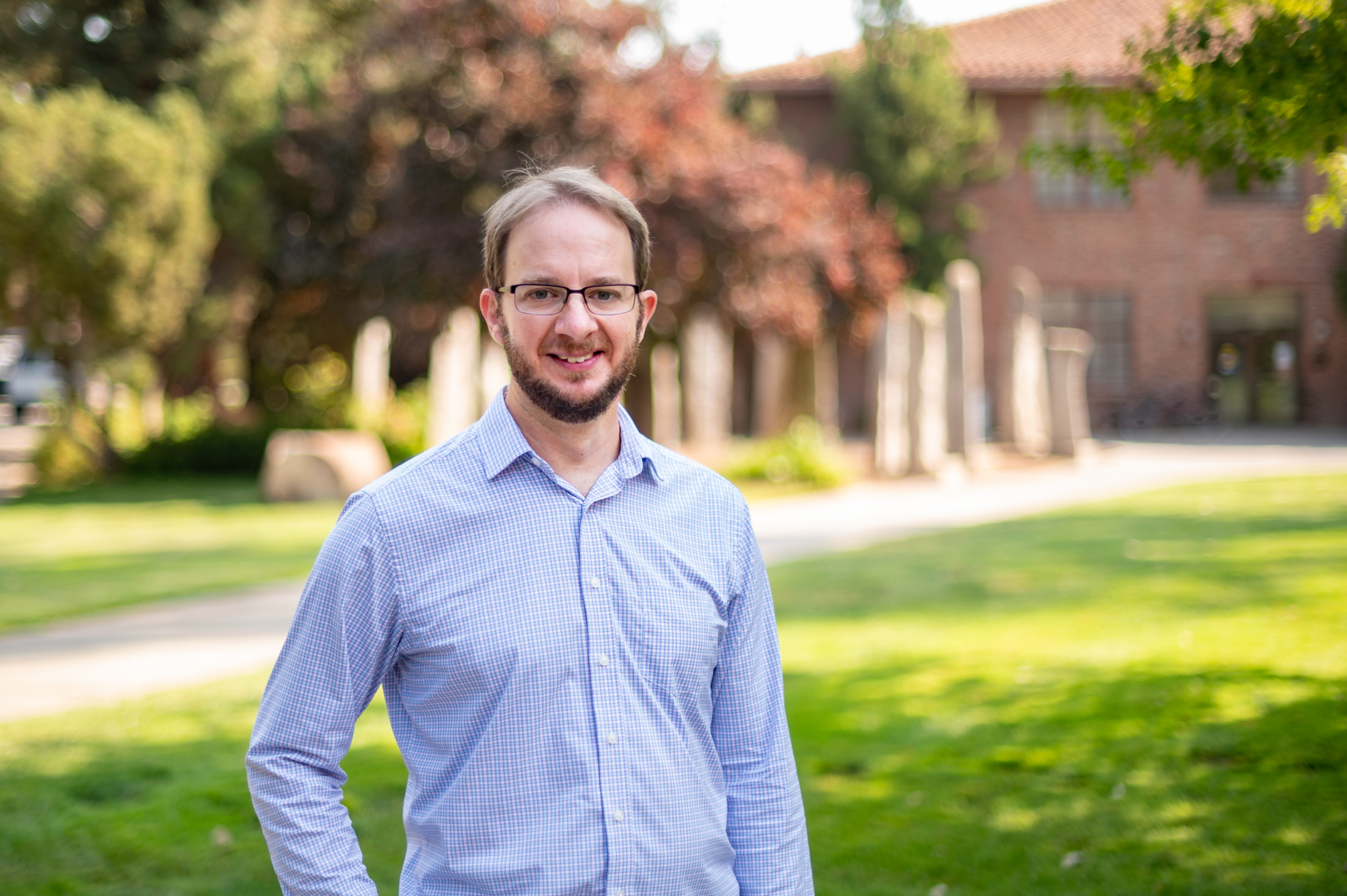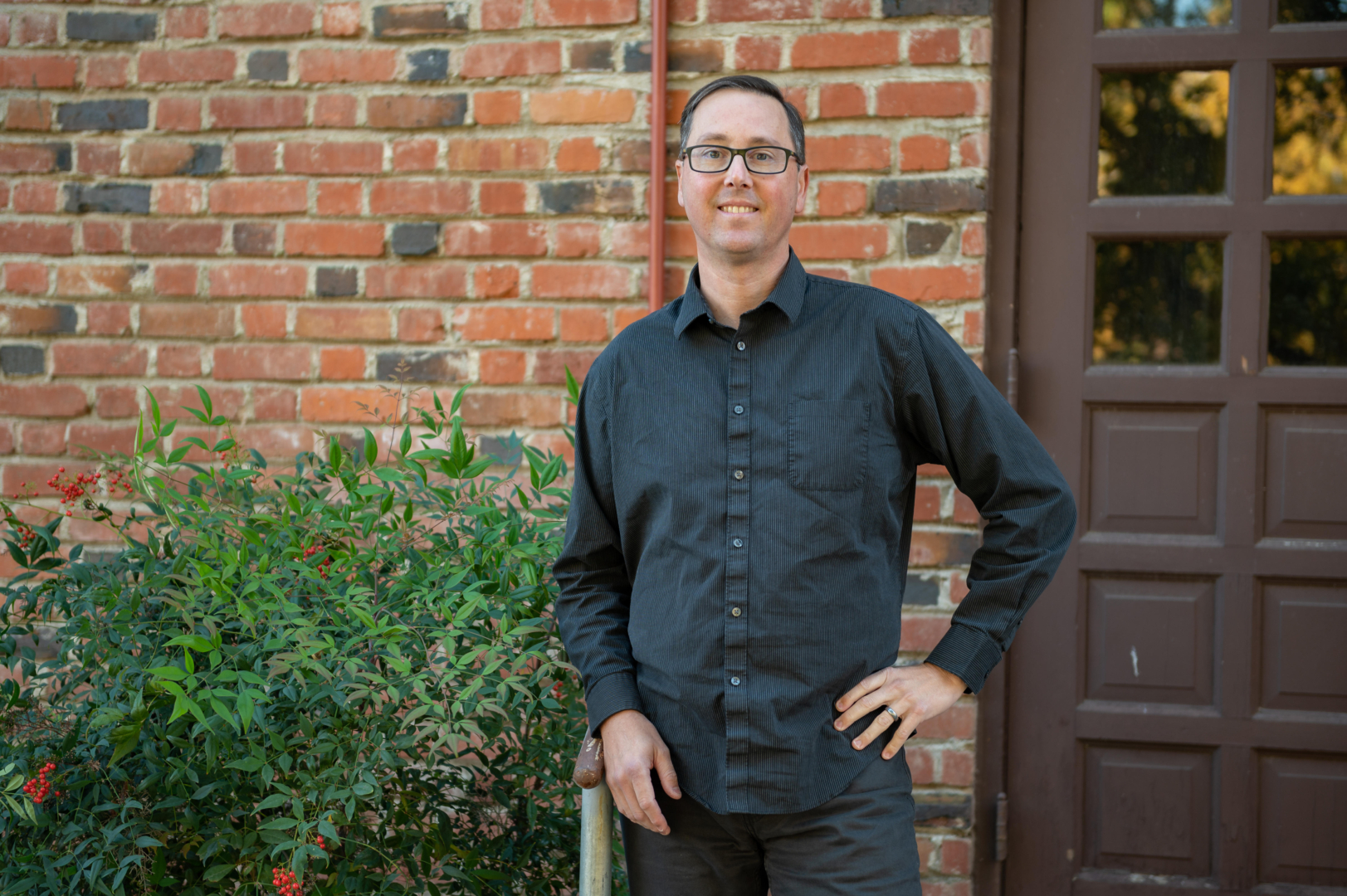University Faculty Awarded Prestigious Lantis Endowments

The university seal at the west entrance to campus on Wednesday, June 26, 2019 in Chico, Calif. (Jason Halley/University Photographer/CSU Chico)
Every year, Chico State faculty are responsible for driving great advancements in their fields. From the cost of hydroelectric power to contemporary political and social changes in Iran to the avian influenza virus, the achievements of our faculty continue to promote student success, community engagements, and scholarly and creative activity.
The University has named three professors as recipients of its annual Lantis Endowed University Chairs, selecting them from a competitive pool of outstanding and worthy applications. Troy Cline, associate professor of biological sciences; Nik Janos, associate professor of sociology; and Najm al-Din Yousefi, associate professor of history, will each receive a financial award to support their research and student-centered learning projects.
“All three of our Lantis Chair honorees are leading-edge researchers who are doing their part to put Chico State on a path to greater prominence,” said University President Gayle Hutchinson. “I am delighted to recognize their achievements, which are advancing knowledge, building solutions, engaging students in research, and positioning Chico State as a global leader.”
Professor David Lantis was a faculty member of the Department of Geography who understood that private giving would help enrich the University’s teaching and learning environment. He and his wife, Helen, donated $2 million to endow University chairs in their name, to be awarded annually.
Endowments of faculty positions help grow and enhance opportunities for students and provide a firm foundation for the people whose work transforms our communities, region, and the world. The awards range from $20,000 to $40,000 (as appropriate to the project), which can be spent on release time, travel, equipment, student stipends, or a summer salary.
Meet the Recipients
Troy Cline

Cline is an extraordinary educator, scholar, and researcher with an extensive background in virology. Much of his work focuses on immune responses to respiratory viral infections—in particular, influenza—and during the COVID-19 pandemic, many on campus looked to Cline for his knowledge and expertise. An associate professor in the Biological Sciences Department since 2013, his classes took on real-world immediacy overnight, especially his popular course “Pandemics, Germs, and Society” (BIOL 311).
Cline’s current project focuses on viruses circulating within waterfowl species in the Sacramento Valley—in particular, northern shoveler ducks. Through the Lantis recognition, Cline has received a $40,000 award to advance his research and assess the relative risk that northern shovelers pose for the carriage and distribution of avian influenza (AVI) in the Central Valley. This project will help provide the groundwork for medical research in combating viruses ranging from seasonal flu strains to pandemics.
Cline, alongside a small team of graduate and undergraduate students, will focus on exposure history and the duration of virus shedding to assess the risk of AVI in northern shovelers. This work builds upon his previous research that identified northern shovelers as having a higher level of AVI than other waterfowl in the Sacramento Valley. His team will utilize the Lantis funding to conduct research, collect and analyze data, and perform crucial experiments to help explain why northern shovelers are so susceptible to the virus.
Wild waterfowl are the major reservoir of nearly all influenza viruses in nature, and according to Cline, the United States has seen two AVI outbreaks in the past five years that have affected the health of both wild birds and economically-prized commercial birds. By studying these AVI strains, they hope to inform public health measures, wildlife management, and safeguards to the US poultry industry while limiting the threat of human exposure to devastating viruses.
“This project matters because understanding more about how the virus circulates in nature will help in developing policies and wetland management practices aimed at reducing the risk of future outbreaks,” Cline said.
Cline has recently published articles about AVIs in the wild waterfowl of the Sacramento Valley in the scientific journals Avian Diseases and Scientific Reports. He holds a PhD from Ohio State University in viral immunology and teaches courses in health microbiology, virology, medical bacteriology, cellular and molecular biology, and pandemics and germs.
Nik Janos

Janos is an innovative and energized scholar, writer, researcher, and educator whose current work focuses on the intersection of urbanization and ecological crisis and the complex factors that feed these crises. He will use the $40,000 award to continue working on his first independently published book, which seeks to contextualize ongoing debates about the social and ecological impacts of hydroelectric power in the Pacific Northwest.
An expert on the urban and environmental history and contemporary condition of the region, Janos aims to make clearer the diverse web of stakeholders of hydroelectric power; the tension between climate change mitigation and environmental protection; the complex process of getting rid of fossil fuels; and the contested energy infrastructure that underpins modern ways of living and structures our relationship with nature.
He will speak with environmental activists, Indigenous People, people working in power and water utilities, and government officials to bring clarity to this central issue: how do people understand and work through the emerging tension between environmental restoration and Indigenous sovereignty on the one hand, and the role that dams perform in the rapid decarbonization needed to avert catastrophic climate change?
“In the end, decisions will have to be made and this book will provide a map of the values, goals, and priorities of a just and democratic low-carbon energy transition to enable informed decision-making,” Janos said.
Janos has been an associate professor in the Sociology Department since 2011 and teaches classes on the environment, globalization, theory, and public sociology. He is deeply committed to understanding and advocating for the low-carbon energy transition, and has contributed as writer and editor for several books concerning environmental justice and urban studies and performed research in post-Katrina New Orleans and the Superfund clean-up on the Duwamish River in Seattle, WA. He also runs Green Space Notes, a blog designed to catalog and discuss current topics related to nature, economy, politics, technology, and cities. Janos holds a PhD in sociology from the University of California, Santa Cruz.
Najm al-Din Yousefi

Yousefi, a scholar of the Islamic Middle East, has been an associate professor in the History Department since 2012, teaching courses in history, religious studies, and the Middle East. His focus of research addresses the intersection of knowledge and society in early Islamic history, and it includes early Islamic economic history, science, and political theory, as well as state-clergy relations in early 20th-century Iran.
He will use his $40,000 award to fund a project that seeks to shed light on the Shia Muslim clerical establishment and its past and present impact on the Muslim world and elsewhere. The project’s goal is to produce a book-length monograph that investigates the transformation of the Iranian clerical establishment during the nineteenth and twentieth centuries, and how it ignited an epoch-making Islamist movement that spread throughout the Middle East. Beyond the monograph, the project will involve collaboration with other scholars, including Chico State colleagues and students, in the form of a conference presentation and an edited volume. This funding will allow Yousefi the time to focus on research and writing, to travel to archives and engage in conference activity, and to complete other tasks crucial to his work.
In addition to its substantial contribution to scholarship, the various components of this project will further enhance public understanding of Islamism and how it affects global relations, especially the role the United States has played and will continue to play in the Muslim world. The project will break new ground with a more objective analysis of Shia Islam, its historic grievances, and its potential role in advancing a more peaceful resolution to the current conflicts in the Middle East and beyond.
“The ongoing protests of Iranian people, especially the women, against their government’s oppressive policies and social practices highlight the need for a new analysis,” said Yousefi. “The Lantis award will provide me with necessary resources to delve into the evolution and transformation of the caste of clergy and its political ambitions in contemporary Iran.”
Yousefi has published scholarly articles and reviews in a variety of academic journals including Iranian Studies, Sociology of Islam, and Review of Middle East Studies, and he is currently organizing a conference panel for the 14th Biennial of Iranian Studies in 2024 to present his research on state-clergy relations in the Shia Muslim world. Yousefi earned a master’s degree in economic policy management from Columbia University, as well as a PhD in science and technology studies with a concentration in the history of science at Virginia Tech.


